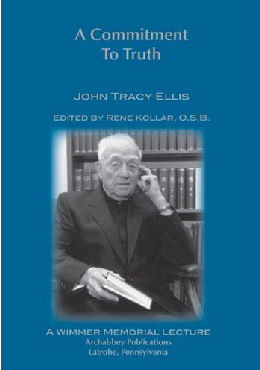
|
Posted December 9, 2010
Book: A Commitment to Truth Author: John Tracy Ellis Edited by Rene Kollar, O.S.B. A Wimmer Memorial Lecture. Archabbey Publication. Latrobe. Penn. 2010. Pp. 62 An Excerpt from the Foreword:
After an overview of Ellis’s life and his academic career, this essay noted that he did not withdraw from the debate, and in 1965, he delivered a lecture, which “was an eloquent and erudite plea for intellectual integrity in Catholic scholarship.” The venue for his talk, “A Commitment to Truth,” was at Saint Vincent College, Latrobe, Pennsylvania, as part of the Wimmer Memorial Lecture Series. An Excerpt from the Book: This is a particularly critical moment in time when, as has been said, those of the rising generation have put a special premium on authenticity, on reality, and on all that is opposed to hypocrisy. The struggle in which the Church is now engaged to make herself relevant to men — exemplified in Vatican Counsel II’s schema on the Church and the Modern World — will, therefore, be like Macbeth’s tale “told by an idiot, full of sound and fury, signifying nothing,” unless her teaching, her intellectual apostolate, her liturgy and worship, yes, and the lives of her sons and daughters, bear a note of authenticity and carry the credentials of truth and honesty. If these be lacking, then, the Church’s voice will be mute in the academic and learned circles where the ideas that will shape tomorrow’s world are being born; in national politics and international affairs where vital issues like civil rights and nuclear warfare clamor for decision; and in the marketplace where the Church aspires to have her doctrine of social justice temper the transactions by which men earn their livelihood and accumulate their fortunes. Some Catholics may be tempted to think a commitment to truth with all that that implies beyond their capacity to fulfill and that, therefore, they may as well not even try. This would be a fatal error that would undermine and nullify their very action. Rather it is incumbent on each individual, whatever be his or her walk in life, to strive incessantly to relate their thinking, speaking, and acting to what is true and real. And in the execution of this grave responsibility on every Christian conscience, one could scarcely do better than to make one’s own Newman’s words: “Let us aim at meaning what we say, and saying what we mean; let us aim at knowing when we understand a truth, and when we do not. When we do not, let us take it on faith, and let us profess to do so. Let us receive the truth in reverence, and pray God to give us a good will, and divine light, and spiritual strength, that it may bear fruit within us.” |
|
